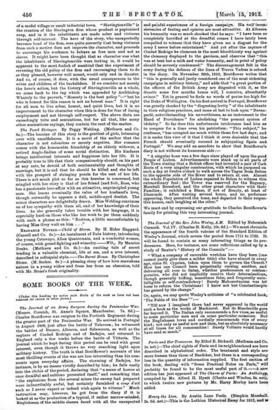SOME BOOKS OF THE WEEK.
[Under this heading we tactics such Books of the week as hare not bees reserved for eerier, In other form.) The Journal of an Army Surgeon during the Peninsular War. (Messrs. Cornish, St. Anne's Square, Manchester. 7s. 6d.)— Charles Boutflower was surgeon to the Fortieth Regiment during the greater part of the Peninsular War. He arrived in Portugal in August 1809, just after the battle of Talavera ; he witnessed the battles of Busaco, Albuera, and Salamanca, as well as the capture of Ciudad Rodrigo and of Badajos, and returned to England only a few weeks before the battle of Vittoria. The journal which he kept during this period can be read with great interest, even though it throws no very searching light upon military history. The truth is that Boutfiower's accounts of the most thrilling events of the war are less interesting than his com- ments upon everyday affairs. The storming of Badajos, for instance, is by no means vividly described by him ; he falls easily into the clicUs of the period, declaring that "a scene of horror at once dreadful and sublime presented itself," and remarking that " the explosions from the several mines the enemy had prepared were indescribably awful, but certainly furnished a coup Boil such as I never expect or indeed wish again to witness." Much instruction may, however, be got from -the diary if it is looked at as-the production of a typical, if rather narrow-minded, Englishman of the middle classes faced with all the unexpected and painful experiences of a foreign campaign. His we(' incon- sistencies of feeling and opinion are most attractive. At Albuera his humanity was so much shocked that he says: "I have been so completely horrified at the dreadful scenes I have lately been compelled to witness th'st they have given me a disgust for the army I never before entertained." And yet after the capture of Ciudad Rodrigo he clamours in the most bloodthirsty way against the clemency displayed to the garrison, and observes that " this was at best but a milk and water humanity, and in point of policy should be severely condemned." The discouragement felt in the army during the defence of the lines of Torres Vedras is echoed in the diary. On November nth, 1810, Boutflowor writes that " this is generally and justly considered one of the most sickening campaigns in military history," and adds that "a great portion of the officers of the British Army are disgusted with it, as the Gazette some few months hence will, I conceive, abundantly evince." Yet in general he finds no words of praise too high for the Duke of Wellington. On his first arrival in Portugal, Boutfiower was greatly shocked by the " disgusting levity " of the inhabitants in their religious practices, and mine at last to look upon " Buena- parte, notwithstanding his unworthiness, as an instrument in the Hand of Providence" for abolishing "the present system of idolatry." So far does this unfortunate intolerance lead. him as to conquer for a time even his patriotism: "This subjet" he confesses, "has occupied me much within these few last days; and it is under this view of it that I think it even desirable that the French should eventually succeed in subjugating Spain and Portugal." We may add an anecdote to show that Boutflower's diary is not without its humorous side :—
" A singular hoax was a few days since played off upon the good People of Lisbon. Advertisements were stuck up in all parts of the Town stating that a British officer had invented a pair of Cork Boots of a very singular construction, with which he purposed on such a day at twelve o'clock to walk across the Tagus from Belem to the opposite side of the River and to return at. one. Almost the whole Population of Lisbon repaired to Belem to witness this- extraordinary feat : the Tower was reserved for the Regency,. Marshall Beresford, and the other great characters with their Families ; it exhibited a Blaze, if not of Beauty, at least of Diamonds. After waiting several hours, and no performer appearing, they perceived the hoax, and departed to their respec- tive homes, each laughing at the other."
We must end by expressing our gratitude to Charles Boutfiower's- family for printing this very interesting journal.














































 Previous page
Previous page